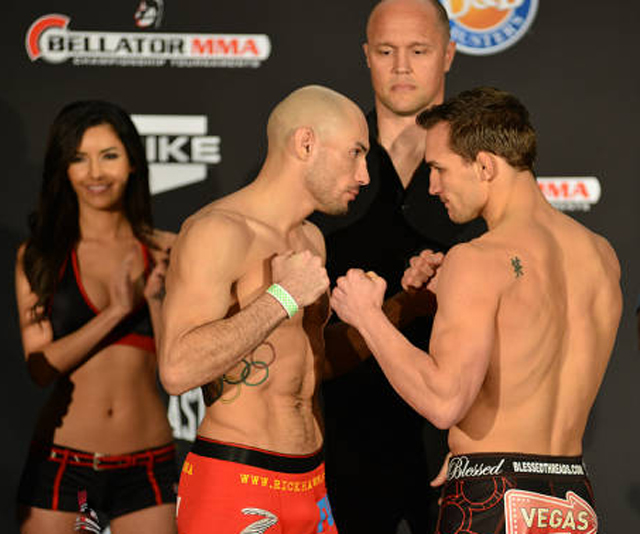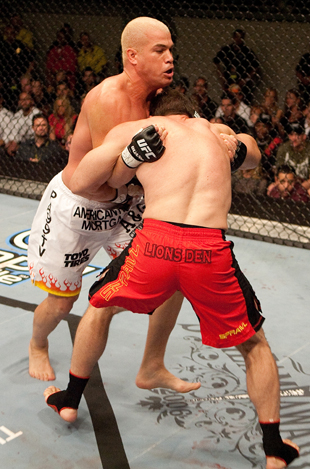 The ratings news for Bellator's heavily hyped debut on Spike TV Thursday was decidedly mixed. The average viewership of 938,000 made it the most-watched show in the promotion's four-year history, though it lost nearly half of its audience that was delivered by TNA Impact Wrestling.
The ratings news for Bellator's heavily hyped debut on Spike TV Thursday was decidedly mixed. The average viewership of 938,000 made it the most-watched show in the promotion's four-year history, though it lost nearly half of its audience that was delivered by TNA Impact Wrestling.
Bellator's move to Spike was precipitated by the end of the UFC's seven-year relationship with Spike in 2011. The UFC broadcast the first season of "The Ultimate Fighter" on Spike in 2005 as a time buy, then stayed on the network for six more seasons.
When the UFC signed an exclusive seven-year deal with Fox in 2011 that put its live events and programming on Fox, FX and Fuel, Spike was without mixed martial arts content. But Spike parent Viacom owns a controlling interest in Bellator and not long after the UFC's departure, Spike and Bellator announced a broadcast relationship.
Spike had a non-compete clause with the UFC and could not air other promotions' MMA content in 2012, so it continued to air replays of UFC content through the year. But in January, Spike was free to air Bellator programming and quickly began, airing Bellator 360 on Jan. 3 and Jan. 10.
Both Spike and Bellator officials banked heavily on the fact that Spike's nearly 100 million television homes would dramatically improve Bellator's ratings. That, in fact, occurred.
The title doubleheader in Irvine, Calif., on Thursday that featured lightweight Michael Chandler defeating Rick Hawn and featherweight Pat Curran besting Patricio "Pitbull" Freire was nearly triple the greatest viewership in its history. Bellator drew 325,000 viewers to MTV2 for Bellator 44 on May 14, 2011. MTV2 is in about 81 million homes.
By that standard, Bellator MMA Live Thursday on Spike was a grand slam home run.
 However, it failed significantly in several other categories. It had a strong lead-in from TNA Impact Wrestling, which averaged 1.82 million viewers, and failed to keep it. Bellator MMA Live shed 49 percent of the audience the wrestling show delivered. The number of males 18-34, which is MMA's primary demographic, was roughly the same for wrestling and Bellator. TNA Impact Wrestling drew 141,000 18-to-34-year-old males, while Bellator increased that slightly to 149,000.
However, it failed significantly in several other categories. It had a strong lead-in from TNA Impact Wrestling, which averaged 1.82 million viewers, and failed to keep it. Bellator MMA Live shed 49 percent of the audience the wrestling show delivered. The number of males 18-34, which is MMA's primary demographic, was roughly the same for wrestling and Bellator. TNA Impact Wrestling drew 141,000 18-to-34-year-old males, while Bellator increased that slightly to 149,000.
The biggest concern for Spike and Bellator officials has to be its performance among 18-to-34 year-old males. Season 13 was the worst-perform year of The Ultimate Fighter, yet it still averaged 578,000 among men 18-34. That was 388 percent better than Bellator's performance Thursday among the same demographic.
The worst the UFC ever did on Spike among males 18-34 was at Ultimate Fight Night 22, when he it attracted 445,000 viewers in the demographic.
Bellator MMA Live also declined Thursday in six of its quarter hour segments, suggesting viewers turned away. A big reason likely is the time slot, given that it began airing live at 10 p.m. on the East Coast. Normally for fight cards on television, the final quarter hour segment or the final two quarter hour segments draw the highest viewership, because that is when the main event is airing. But in Bellator's case, the final two quarter hour segments were its lowest.
In the first 15-minute segment, Bellator hit its peak of 1.219 million viewers. That was still a 33 percent decline from the number Spike had watching wrestling. The show ran 12 minutes long, meaning there were nine quarter hour segments, and Bellator saw a drop from the previous quarter hour in six of them.
It averaged 1.219 million at the open, from 10 p.m. to 10:15 p.m., according to Nielsen numbers. That went to 1.025 million from 10:15 p.m. to 10:30, then ticked up slightly to 1.033 from 10:30 to 10:45. But it had a sharp decline from 10:45 to 11, dropping to 871 thousand viewers.
It also performed poorly against all 14 seasons of The Ultimate Fighter on Spike. The UFC's reality show had a high average viewership of 2.957 million viewers in Season 10, which featured Kimbo Slice. Its lowest-rated season was Season 13, which averaged just 1.38 million viewers.
It also didn't do as well as any of the 26 separate Ultimate Fight Night cards the UFC aired on Spike. The Fight Night cards were numbered Fight Night 1 through 25, with a special card called Ortiz-Shamrock as the 26th.
Those ratings ranged from an average of 4.169 for the third Tito Ortiz-Ken Shamrock fight to 1.151 million for Ultimate Fight Night 22 on Sept. 15, 2010.
It certainly wasn't a home run for Bellator and Spike, though it was not a disaster. The ratings were OK and need to go up to maintain advertiser interest. Significantly, Bellator is going to have to find a way to attract those 18-to-34 year-old males that advertisers covet for it become a long-term success.
The numbers it was attracting on MTV2 were genuinely disastrous, though the cards were aired in standard definition, not high definition. The first Bellator show on Spike was more like a single than a home run in terms of ratings performance, but there is at least room to grow.
nerlens noel don t trust the b in apartment 23 world financial center shabazz muhammad angela corey zimmerman charged bonobos
No comments:
Post a Comment